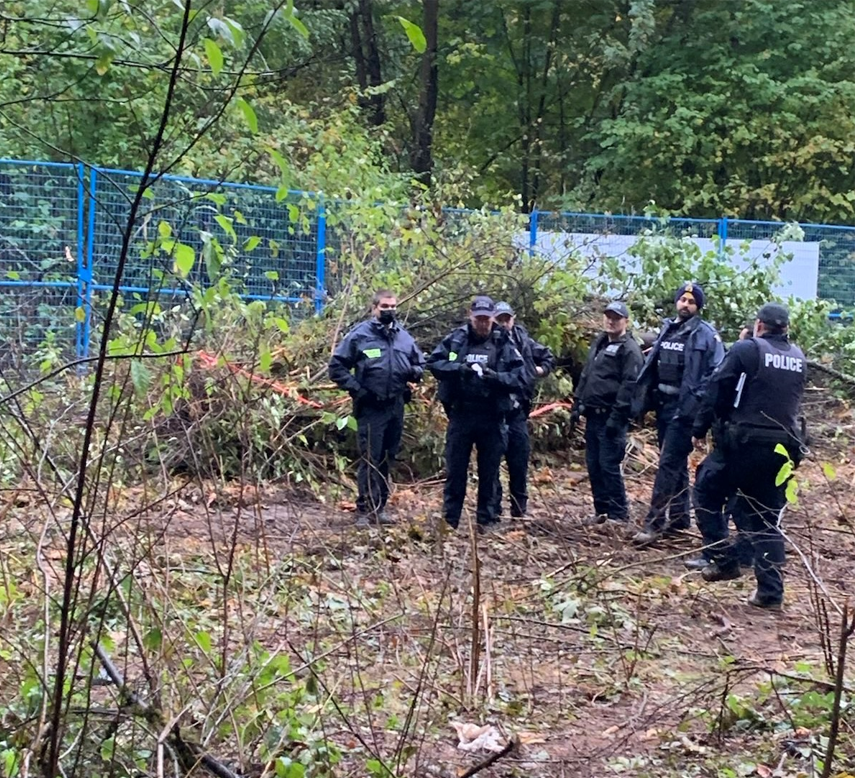Police in Burnaby say a Trans Mountain worker was knocked unconscious last week at the site of a “tree-sit” protest opposing pipeline expansion.

The worker was taken to hospital for treatment of his injuries, including a possible concussion, says a news release from Burnaby RCMP issued Tuesday morning.
“It appears the branch fell on the worker while the protester was repelling between tree-sits,” it said.
READ MORE: One arrested, charged at Burnaby ‘tree-sit’ against Trans Mountain pipeline
The incident took place Sept. 24 at the tree-sit camp, which was in place for several weeks in the Burnaby forest to stop logging related to the expansion’s construction.
Two demonstrators were also arrested that day, say RCMP. The first was in relation to trespassing on private property against an injunction, and the second was in relation to the injured Trans Mountain worker, Cpl. Michael Kalanj told Global News.
Police are investigating whether any finding of fault can be made between the tree-sitter, the fallen branch and the worker, he explained.

The tree-sit camp lies on private property owned by BNSF Railway in an area that violates a court-ordered injunction against blocking access to Trans Mountain worksites.
On Tuesday, Protect the Planet Stop TMX, the group occupying the site, tweeted that it was making a “tactical retreat In the forest in the face of overwhelming forces of the petro-state,” (sic).

Get daily National news
“We will not stop defending the planet since we know the state will not,” reads the tweet.
“The Kenney-Trudeau TMX pipeline is a climate catastrophe that must be stopped for future generations.”
READ MORE: B.C. could see ‘catastrophic’ consequences from climate change-related events in 30 years: report
Dr. Tim Takaro, a physician, scientist and health sciences professor at Simon Fraser University, said Trans Mountain contractors were on-site Tuesday taking apart the remaining tree-sit structures, but more will be set up on Wednesday.
“We cannot survive on a planet that keeps warming the way these pipelines make the planet warm,” he said in an interview. “So we must stop these pipelines, it’s a moral imperative.”
Takaro has been part of the tree-sit camps since August 2020. He said Tuesday was a “bad day” because they lost “this battle,” but the demonstrators in support of a healthy planet aren’t going anywhere.

Takaro also treated the Trans Mountain worker who was injured last Friday by a fallen tree branch.
He said he’s glad the injuries were not serious and regrets the incident took place, but believes it was preventable.
“We told the workers, ‘Do not get under this tree house, stuff falls,'” he explained. “We told them for two days … they need to work safely and they were not working safely.”
Global News has reached out to Trans Mountain for comment on this story, but as of Tuesday afternoon, had not received a response.
READ MORE: BC Hydro, province lay out plan to move away from fossil fuels
If it’s completed, the Trans Mountain expansion will triple the capacity of an existing pipeline that transports 300,000 barrels of oil per day from Alberta to terminals and refineries on the west coast.
Opponents of the pipeline expansion say it would do irrevocable harm to the environment, push Canada’s emissions targets out of reach, and violate the sovereignty of First Nations who have taken a stance against it.
Its supporters, however, tout the much-needed jobs the expansion will provide B.C. and Alberta, in addition to billions of dollars in benefits to governments and communities. Trans Mountain has also insisted the pipeline expansion can and will be operated safely with minimal environmental impacts.

On Tuesday, the provincial government revealed a new plan to transition B.C. away from fossil fuels, in collaboration with BC Hydro. It includes incentives for people to switch from fossil fuels to electricity to power their homes, businesses and cars.
Takaro said B.C., and Canada’s, climate action approach must exclude new pipelines.
“I think connecting the dots for people between this pipeline and people dying from climate change, like the hundreds that died in the heat this summer — that is the most important connection to be made.”








Comments
Want to discuss? Please read our Commenting Policy first.